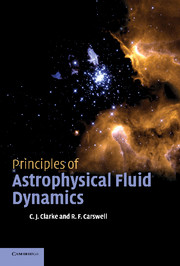Book contents
- Frontmatter
- Contents
- Preface
- 1 Introduction to concepts
- 2 The fluid equations
- 3 Gravitation
- 4 The energy equation
- 5 Hydrostatic equilibrium
- 6 Propagation of sound waves
- 7 Supersonic flows
- 8 Blast waves
- 9 Bernoulli's equation
- 10 Fluid instabilities
- 11 Viscous flows
- 12 Accretion discs in astrophysics
- 13 Plasmas
- Appendix Equations in curvilinear coordinates
- Exercises
- Books for background and further reading
- Index
7 - Supersonic flows
Published online by Cambridge University Press: 05 June 2012
- Frontmatter
- Contents
- Preface
- 1 Introduction to concepts
- 2 The fluid equations
- 3 Gravitation
- 4 The energy equation
- 5 Hydrostatic equilibrium
- 6 Propagation of sound waves
- 7 Supersonic flows
- 8 Blast waves
- 9 Bernoulli's equation
- 10 Fluid instabilities
- 11 Viscous flows
- 12 Accretion discs in astrophysics
- 13 Plasmas
- Appendix Equations in curvilinear coordinates
- Exercises
- Books for background and further reading
- Index
Summary
In the last chapter, sound waves were introduced as the way that low amplitude (i.e. linear) disturbances propagate in a fluid. But what if a piece of fluid is subject to a non-linear disturbance, e.g. compression by a large factor or acceleration to velocities that are large compared with the sound speed? The result of such a disturbance is the propagation of a shock. On Earth, shocks are produced, for example, by the rapid pushing of a piston into a cold gas, or by the passage of a supersonic aircraft.
Astrophysics abounds in shock phenomena because gravity is an effective way of accelerating gas to high velocities: for example, gas free-falling onto the surface of stars or gas orbiting in a spiral galaxy like the Milky Way travels at hundreds of kilometres per second; in clusters of galaxies, the free-fall speed of the gas may attain thousands of kilometres per second. Such speeds correspond to the speed of sound in gas that is respectively at ~106 K and ~108 K; for gas that is cooler than this, any relative motion between fluid elements at these sorts of speeds must result in a shock. Note that acceleration to supersonic velocities (in the frame of the galaxy, say) does not itself generate a shock, since in its own rest frame the gas is at rest!
Information
- Type
- Chapter
- Information
- Principles of Astrophysical Fluid Dynamics , pp. 77 - 88Publisher: Cambridge University PressPrint publication year: 2007
